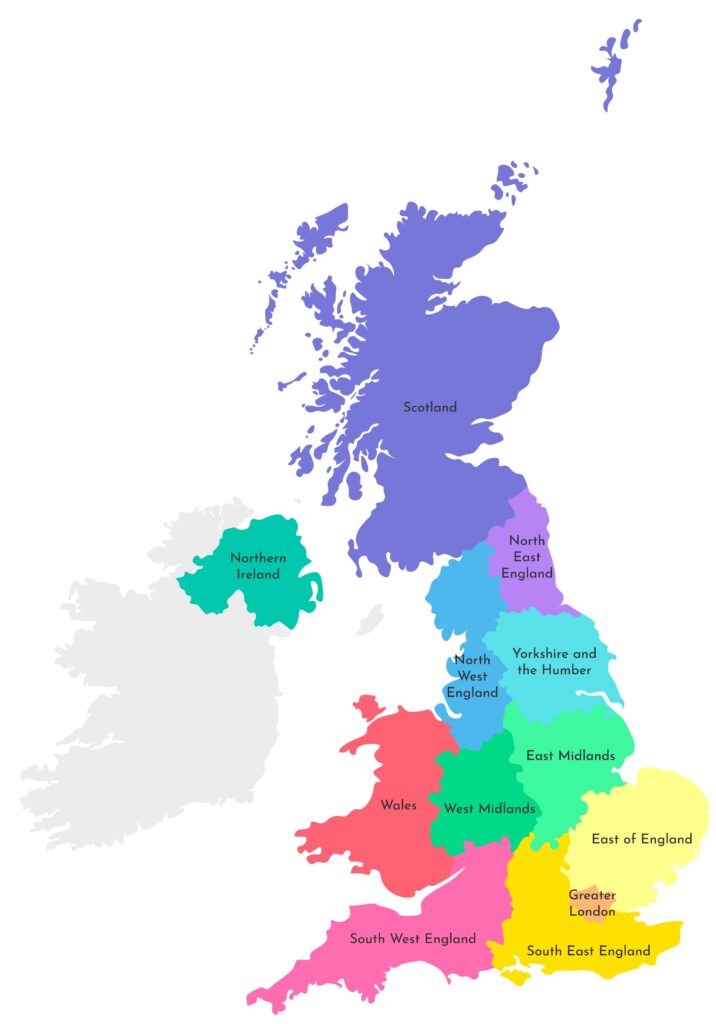A brief guide to British accents and dialects

If you’re considering learning English in the UK, you might think you’ll return home with a perfect accent that sounds like you got English lessons from the King himself! In reality, there are almost 40 different British accents and dialects that sound very different from each other! The most well-known is Received Pronunciation (RP), which is classed as the “standard” British accent (this is the accent you hear King Charles using!)
That’s right, accents and dialects vary greatly across Great Britain. There is no such thing as a single ‘British accent’. Instead, it’s an amalgamation of different ones that have been shaped by history, and made iconic through TV and film. Here is a brief guide to British accents and dialects.
Some British accents and dialects by region
| British Accent | Region |
| RP (Received Pronunciation) | London & South East England |
| Cockney | London |
| Scouse | Liverpool (North West England) |
| Geordie | Newcastle (North East England) |
| Brummie | Birmingham (West Midlands) |
| West Country English | South West England |
| Scottish | Scotland |
| Welsh | Wales |
| Northern Irish | Northern Ireland |

Here’s a guide to these accents and dialects, which you’re sure to encounter on any trip to the UK.
RP
Received Pronunciation (RP) is often referred to as “Standard English” the “Queen’s English” or “BBC English”. It has traditionally been associated with the middle and upper classes.
RP is considered to have the widest geographical distribution and the fewest regional peculiarities. It was originally the pronunciation of educated speakers in southern England and traditionally used in the public schools. It was also used at Oxford and Cambridge universities and adopted by many speakers elsewhere and widely used in broadcasting.
Speech sample:
Catherine, Princess of Wales
Cockney
Over the centuries, the cockney accent has become synonymous with working-class London, specifically associated with the East End of London.
The Cockney dialect also gave us rhyming slang, a humorous slang first used by cockneys in the east end of London and now understood widely in London and throughout Britain.
Invented in London in the 1840s by market traders, costermongers and street hawkers, it was probably first used as a language designed to disguise what was being said from passers-by.
Cockney rhyming slang is still in use today – the next time you visit London, keep your ears peeled for it!
Speech sample
Michael Caine
https://www.youtube.com/watch?v=XBjp1oEZcwU
Scouse
The term Scouse refers to Liverpool English and an inhabitant of Liverpool is a Liverpudlian or Scouse(r). The Scouse accent is well-know throughout Britain and the world, mainly due to the Beatles! It is one of the most distinctive regional accents in England, with unique sound variations and a melody all of its own.
Speech sample
Paul O’Grady and Cilla Black
Geordie
As the oldest English dialect still spoken, Geordie refers to the people and dialect of Newcastle-Upon-Tyne in Northeast England. It is one of the strongest and most distinctive accents in England. At its broadest, the dialect is very different from Standard English in terms of its pronunciation and some of the constructions and words that are used. Many Geordies say divn’t knaa for ‘don’t know’, for example, and talk about their bairns (‘children’).
Speech sample
Cheryl Cole
Brummie
The Brummie dialect is spoken by many people in Birmingham, England, and some of its surrounding area.
The melody of Brummie is truly distinctive. It has a monotone nature with long stretches hitting the same note. But when Brummies stress a word, it tends to lengthen considerably, and this can be followed by sharp rises or falls in tone.
Speech sample
Ozzy Osbourne
West Country
The West Country accent can be heard in South West England and extending to the Welsh border. Often, the letter ‘r’ is pronounced after vowels. Someone with a West Country accent would say ‘mutherrr’ instead of saying mother as ‘muthah’.
Speech sample
Hagrid from Harry Potter
Scottish
Scottish English is heavily influenced by the Gaelic language, which was, and still sometimes is, spoken in certain areas of Scotland, as well as Norse languages from Viking invaders.
Compared to standard English, the Scottish accent has a very different rhythm, giving it a distinct sound.
Scots use the sound ‘oo’ instead of ‘ow.’ For example, ‘house’ sounds like ‘hoose’ and ‘about’ sounds like ‘aboot.’ Scots also pronounce ‘eh’ as ‘ee’ so you’ll hear them say ‘heed’ instead of ‘head.’
Another interesting difference is that in standard English ‘you’ is used as a singular and plural personal pronoun. In the Scottish accent, ‘yous’ is used as a plural pronoun. For example, “Are yous okay?”
Speech sample
David Tennant
Welsh
Wales has its very own language and it is very different to English. In fact, the town with the longest name is in Wales. It’s called Llanfairpwllgwyngyllgogerychwyrndrobwllllantysiliogogogoch!
When Welsh people speak English, their accent is instantly recognisable – they pronounce words like ‘Wales’ as WEE-alss unlike the English, who pronounce it WAY-ells.
Speech sample
Gareth Bale
Northern Irish
The Northern Irish accent is quite a beautiful one, and a strong one too. The first thing you’ll probably notice about Northern Irish is how many letters seem to be missing from words when people speak it. For example, ‘Northern Irish’ is pronounced more like ‘Nor’n Ir’sh’! They have a very tight, rigid mouth when they say ‘cow’, ‘now’, or ‘how’ and this makes the sound shorter and less round than most other UK accents.
Speech sample
Kenneth Brannagh
If you’ve been inspired to learn English, consider enrolling on one of our English as a Foreign Language (EFL) courses and develop your English skills in the company of like-minded students in the beautiful city of Cambridge.









